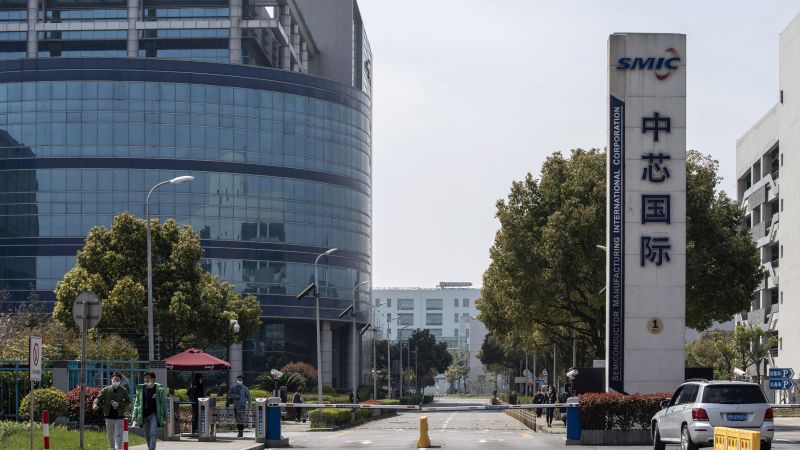Main Topic: The Biden administration's plan to issue an executive order restricting U.S. investment in high-tech industries in China.
Key Points:
1. The executive order will target specific high-tech sectors in China, such as quantum computing, artificial intelligence, and advanced semi-conductors.
2. The order is part of growing tensions between the U.S. and China.
3. The administration had previously delayed certain punitive economic measures against China but denies delaying actions for national security reasons.
Main topic: President Joe Biden's executive order on limiting American investment in certain Chinese tech firms.
Key points:
1. The executive order aims to address national security concerns related to companies dealing with sensitive technologies like semiconductors, quantum computing, and artificial intelligence.
2. The order is narrowly targeted to bar funding of entities engaged in specific activities that pose acute national security risks.
3. This is not the first time the US has sought to limit the influence of Chinese tech firms, with previous restrictions on Huawei, supercomputing technology sales, and pressure on ByteDance to sell TikTok.
Main topic: The Biden administration's proposed regulations to curb U.S. investments in key technology sectors in China due to concerns about enhanced battlefield capabilities.
Key points:
1. The proposed regulations aim to prohibit certain investment transactions between U.S. citizens and companies in China in specific technology sectors.
2. For semiconductors and quantum information technologies, the regulations specify where U.S. investors will no longer be allowed to invest in China.
3. However, for AI systems, there are challenges in distinguishing between military and civilian applications, and the administration seeks to shape a prohibition based on the entities involved in the transaction.
Main topic: Last week, U.S. President Joe Biden signed an executive order that began the process of enacting restrictions on U.S. investment in three technology sectors in China: semiconductors, quantum information technologies, and artificial intelligence.
Key points:
1. The executive order limits the scope of investment restrictions to these three technology sectors and prioritizes curbs on military applications.
2. The restrictions on China's technology sector align with the administration's broader strategy to slow China's tech growth by blacklisting companies and blocking exports of critical technologies.
3. The Treasury Department's proposed limitations and notification requirements for investment in these sectors are relatively narrow and include certain exemptions and restrictions on end uses.
Note: This response condenses the provided text and presents the main topic and key points in a concise manner.
Nvidia warns that stronger US restrictions on chip sales to China will harm American companies in the long term, while also acknowledging that stricter rules wouldn't have an immediate material impact on their finances.
Arm, the British chip designer, expressed concerns about potential restrictions on its business in China due to regulatory and trade war risks, which could impact its revenue from the country, according to its recent SEC filing for its IPO.
The executive order announced by President Biden restricts US venture capital and private equity investments in sensitive Chinese tech sectors, potentially ending foreign investment in areas such as chips and AI in China.
China is planning a $41 billion fund to boost its semiconductor industry in response to US restrictions on exporting chips to the country.
China has defied US-led export restrictions by producing a 5G smartphone, Huawei's Mate 60 Pro, using an advanced silicon chip made by Semiconductor Manufacturing International Corp (SMIC), indicating progress in China's efforts to build a domestic chip ecosystem.
The chair of the House of Representatives' committee on China has called for the U.S. Commerce Department to halt all technology exports to Huawei and China's top semiconductor firm, SMIC, after the discovery of new chips in Huawei phones that may violate trade restrictions.
China's top chipmaker, Semiconductor Manufacturing International Corp., is under investigation for potentially violating US sanctions by supplying components to Huawei Technologies Co., according to a US lawmaker.
Ten Republican lawmakers are urging the Commerce Department to impose stricter sanctions on Huawei and Semiconductor Manufacturing International Corp. (SMIC), after the companies showcased a domestically manufactured advanced smartphone chip that allegedly violated U.S. export controls, prompting concerns about the effectiveness of current export controls in preventing U.S. technology from reaching China.
China's commerce ministry has imposed new restrictions on the export of gallium and germanium compounds due to national security concerns, potentially impacting China's technology industry ambitions.
Intel's AI chips designed for Chinese clients are experiencing high demand as Chinese companies rush to improve their capabilities in ChatGPT-like technology, leading to increased orders from Intel's supplier TSMC and prompting Intel to place more orders; the demand for AI chips in China has surged due to the race by Chinese tech firms to build their own large language models (LLMs), but US export curbs have restricted China's access to advanced chips, creating a black market for smuggled chips.
The Biden administration has imposed new trade restrictions on Chinese and Russian companies for supplying drone components used in Russia's war effort in Ukraine.
The US government's export restrictions on advanced computer chips is seen as a move to control China's access to AI technology and prevent Middle Eastern countries from becoming conduits for Chinese firms to acquire these chips, with countries like Iran, Saudi Arabia, UAE, Qatar, and Israel being the most likely candidates affected by the restrictions.
The Biden administration plans to update export rules restricting shipments of AI chips and chipmaking tools to China in an effort to stabilize relations between the two countries.
